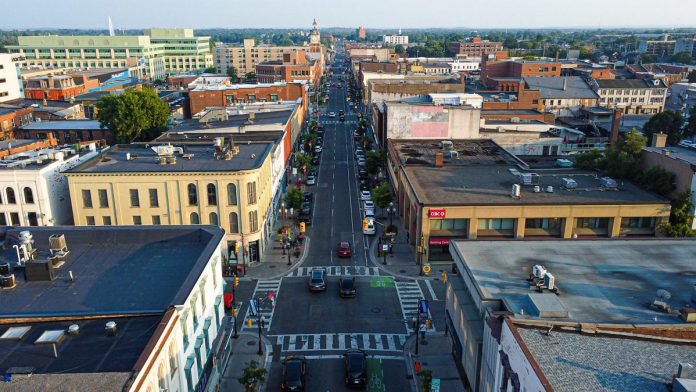
The Peterborough Downtown Business Improvement Area (DBIA) has responded with a “strong warning” about a proposed by-law drafted by the City of Peterborough that would enable the city to claw back its $150,000 annual payment to the DBIA.
The city’s $150,000 in annual funding to the DBIA was the result of a 2017 settlement between the DBIA and the city, after the DBIA and property rental company AON inc. agreed to drop their appeals to the Ontario Municipal Board of the city’s decision to allow a casino at 1400 Crawford Drive instead of in the downtown core.
Under the settlement, the city agreed to pay the DBIA $150,000 annually for 20 years — funding that the DBIA has been using for events, promotion, and security — for a total of $3 million.
The proposed by-law (By-Law Number 25-126), which will be considered during a city council meeting on Monday (December 1), uses a section of the Municipal Act that allows a municipality to pass a by-law to assume a power or duty of local board. By considering the DBIA board’s ability to receive the city’s payment as a “power” or “duty” of the board, the city will assume that power, essentially allowing the city to become the recipient of its own payments instead of the DBIA.
On Friday (November 28), the DBIA issued a strongly worded media release about the proposed bylaw, warning that it “would shift authority over funds that have long supported downtown stability, revitalization, safety, and economic activity — potentially weakening the DBIA’s ability to deliver services at a time when downtown businesses are already facing unprecedented pressures.”
Noting it was not consulted on the development of the by-law, DBIA executive director Nour Mazloum is “raising urgent questions about how this change would affect the organization’s ability to carry out its mandate during an already challenging economic period.”
“Downtown businesses have been navigating higher operating costs, increased taxes, tariffs, and the lingering impacts of COVID-19,” Mazloum states in the release. “This is precisely the time when they need more support, not less.”
“We have been transparent, responsible, and accountable with every dollar we manage. That’s why this by-law is so concerning — it breaks trust. If the city can change direction without discussion on something this important, what will they do next? Trust requires year over year consistency. Right now, that’s what’s at risk.”
Mazloum added that, while the DBIA is committed to maintaining its “long-standing, collaborative working relationship” with city staff, “major financial or governance changes require proper consultation.”
“You can’t pass a by-law without considering the consequences — this one has them,” says DBIA board chair Sacha Lai-Svirk in the release.
“A by-law like this sends a message about the city’s commitment (or lack of commitment) to stability, predictability, and partnership. After the progress we’ve made together, introducing doubt right now is strategically harmful. It risks undoing years of work to rebuild confidence with the city.”
While noting the DBIA “is not opposed to tough conversations,” Lai-Svirk added “decisions of this magnitude must be informed, transparent, and collaborative.”
“I’ve run a small business downtown for 20 years,” Lai-Svirk said. “I know exactly what uncertainty does to a business. The last thing our businesses need is confusion about the city’s support.”
Lai-Svirk also reacted to an unattributed comment from city staff that a Peterborough resident posted on social media, which indicates the proposed by-law will not change the settlement agreement.
“If this by-law doesn’t change anything, then passing it is unnecessary,” she said. “And if it does change something, the city needs to explain exactly what — and why.”
Lai-Svirk noted the settlement agreement with the city provided the DBIA with $150,000 in stable funding each year until 2037, and the city assuming responsibility for the administration of the funds “creates the possibility of future reductions or redirection.”
In the release, the DBIA provided a list of risks that will result if the city passes the proposed by-law without consulting with the DBIA:
- undermining downtown stability during a volatile economic period
- creating uncertainty for over 400 businesses that rely on DBIA support
- damaging trust between the city and downtown stakeholders
- sending a negative signal to investors, developers, and new businesses
- interrupting momentum at a time when the downtown has finally turned a corner
- jeopardizing future collaborative initiatives, including a permanent lighting strategy, downtown boundary expansion, high-speed rail (Alto) integration, event centre activation, and new streetscape, placemaking, and safety programs
The DBIA is calling on city council to vote against the by-law, conducted a full legal and strategic review, engage with the DBIA, AON Inc., and downtown stakeholders, and reassess the by-law in the context of downtown’s economic recovery.
In the release, Lai-Svirk says that DBIA and AON Inc. may take further action if the by-law proceeds.
“We are prepared to defend the future of downtown businesses,” Lai-Svirk said. “If council chooses to move forward without consultation, AON Inc. and the DBIA are prepared to take every appropriate step to protect downtown businesses and the commitments made to this community. But our hope is to resolve this collaboratively. We want decisions that strengthen our momentum, not undermine it.”
After kawarthaNOW reached out to the City of Peterborough asking about the rationale for the by-law and how the by-law would affect the DBIA’s budget, the city’s director of strategic communications Brendan Wedley provided a response that addressed the budget question but not the rationale for the by-law.
“There would be no impact on the DBIA’s commitments for funding programming in 2026 for purposes as per the settlement agreement,” an email from Wedley states.
“The settlement agreement remains in place. The City would take on the obligation of using the settlement payment for security purposes and for promotion of the Central Area as stipulated in the settlement agreement. For 2026, the City would review the DBIA’s intended uses of the settlement funding with the intention to maintain the funding for its commitments for security and promotion of the Central Area.”
“For looking beyond 2026, the City would continue to work with the DBIA on its mandate for promotion and beautification of the downtown with the City using the settlement agreement funding for security and promotion of the Central Area, as per the terms of the agreement.”
Councillors will vote on the proposed by-law during the December 1 city council meeting, which begins at 5 p.m. and will be livestreamed on the city’s website. The by-law is one of only two agenda items.
Registered delegations will be heard during the meeting.
The original version of this story has been updated to include a response from the City of Peterborough.


























